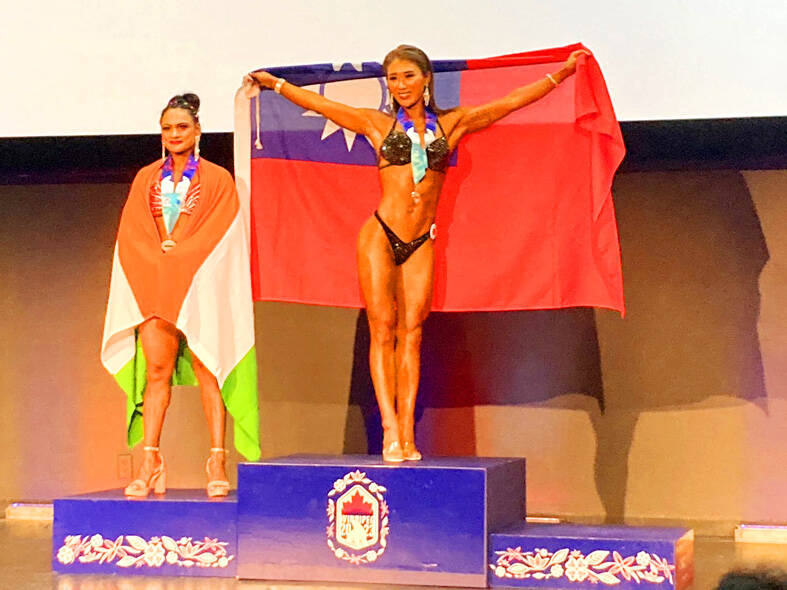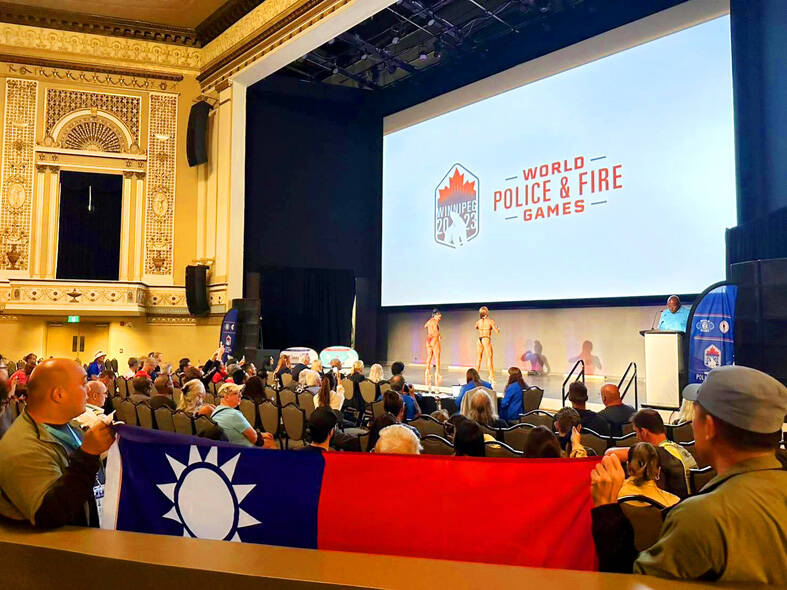The National Police Agency (NPA) yesterday tried to deflect criticism after one of its officers stopped Taiwanese competitors at the World Police and Fire Games in Canada from displaying the Republic of China (ROC) flag at the opening ceremony.
The NPA in a statement said that it did not prevent athletes from showing the flag at the games.
It said that the Taiwanese winners of three gold and four silver medals at the games on Saturday all draped themselves in the ROC flag, and members of Taiwan’s delegation also held up flags at the award ceremony.

Photo courtesy of the National Police Agency
Wang Ling-hua (王令樺) of the Taipei City Police Department won two gold medals in the bikini fitness and physique competitions, while Hsu Hao-han (許顥瀚), a Miaoli firefighter, won a gold medal in wrestling.
The NPA’s statement came after Huang Yuh-min (黃郁閔), a member of the Taoyuan Fire Department, on Saturday wrote on Facebook that he and other firefighters were told by an NPA officer leading the Taiwanese delegation to put away the national flag during the opening ceremony in Winnipeg.
In a video uploaded by Huang, a police officer, wearing a shirt with the words “Chinese Taipei” on the back, referred to the “Olympic model” when requesting that Huang not display the national flag.

Photo courtesy of the National Police Agency
Huang said the police officer, using an “explicit threatening tone,” asked about his affiliated department, and the two filmed each other with cellphones before going their separate ways.
An earlier NPA statement issued on Saturday said that the agency is responsible for forming the team that participates in the biennial games, with the National Fire Agency assisting in the selection process.
One person from the department was selected and participated on official leave with travel expenses covered by the agency, while others from fire departments nationwide formed their own teams and attended the games at their own expense, which meant that they were not under the NPA’s supervision, it said.
The “Olympic model” refers to an agreement signed between the ROC and the International Olympic Committee (IOC) in 1981 to resolve disputes over the representation of athletes from Taiwan in international sporting events. Under the agreement, Taiwanese athletes are to compete under the name “Chinese Taipei” using the Chinese Taipei Olympic Committee flag.
However, the World Police and Fire Games, which runs until Sunday, is not governed by the IOC.
The NPA on Saturday said it has been following the Olympic model since Taiwan’s delegation first participated in the competition in 1999.
The agency said that, based on experience, it is not guaranteed that the national flag would be displayed as expected during an opening ceremony or award presentations, given that each edition is organized by a different host.
It said that the delegation would make every effort to display the national flag without compromising the participants’ qualifications.
Minister of the Interior Lin Yu-chang (林右昌), who oversees the national police and fire agencies, on Saturday wrote on Facebook that there might have been a misunderstanding over the flag.
Lin said that he instructed NPA Director-General Huang Ming-chao (黃明昭) to convey his message to the delegation that they need not worry and encourage them to proudly display the national flag.

BUILDUP: US General Dan Caine said Chinese military maneuvers are not routine exercises, but instead are ‘rehearsals for a forced unification’ with Taiwan China poses an increasingly aggressive threat to the US and deterring Beijing is the Pentagon’s top regional priority amid its rapid military buildup and invasion drills near Taiwan, US Secretary of Defense Pete Hegseth said on Tuesday. “Our pacing threat is communist China,” Hegseth told the US House of Representatives Appropriations Subcommittee on Defense during an oversight hearing with US General Dan Caine, chairman of the Joint Chiefs of Staff. “Beijing is preparing for war in the Indo-Pacific as part of its broader strategy to dominate that region and then the world,” Hegseth said, adding that if it succeeds, it could derail

CHIP WAR: The new restrictions are expected to cut off China’s access to Taiwan’s technologies, materials and equipment essential to building AI semiconductors Taiwan has blacklisted Huawei Technologies Co (華為) and Semiconductor Manufacturing International Corp (SMIC, 中芯), dealing another major blow to the two companies spearheading China’s efforts to develop cutting-edge artificial intelligence (AI) chip technologies. The Ministry of Economic Affairs’ International Trade Administration has included Huawei, SMIC and several of their subsidiaries in an update of its so-called strategic high-tech commodities entity list, the latest version on its Web site showed on Saturday. It did not publicly announce the change. Other entities on the list include organizations such as the Taliban and al-Qaeda, as well as companies in China, Iran and elsewhere. Local companies need

CROSS-STRAIT: The MAC said it barred the Chinese officials from attending an event, because they failed to provide guarantees that Taiwan would be treated with respect The Mainland Affairs Council (MAC) on Friday night defended its decision to bar Chinese officials and tourism representatives from attending a tourism event in Taipei next month, citing the unsafe conditions for Taiwanese in China. The Taipei International Summer Travel Expo, organized by the Taiwan Tourism Exchange Association, is to run from July 18 to 21. China’s Taiwan Affairs Office spokeswoman Zhu Fenglian (朱鳳蓮) on Friday said that representatives from China’s travel industry were excluded from the expo. The Democratic Progressive Party government is obstructing cross-strait tourism exchange in a vain attempt to ignore the mainstream support for peaceful development

ELITE UNIT: President William Lai yesterday praised the National Police Agency’s Special Operations Group after watching it go through assault training and hostage rescue drills The US Navy regularly conducts global war games to develop deterrence strategies against a potential Chinese invasion of Taiwan, aimed at making the nation “a very difficult target to take,” US Acting Chief of Naval Operations James Kilby said on Wednesday. Testifying before the US House of Representatives Armed Services Committee, Kilby said the navy has studied the issue extensively, including routine simulations at the Naval War College. The navy is focused on five key areas: long-range strike capabilities; countering China’s command, control, communications, computers, cyber, intelligence, surveillance, reconnaissance and targeting; terminal ship defense; contested logistics; and nontraditional maritime denial tactics, Kilby